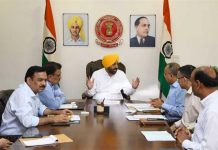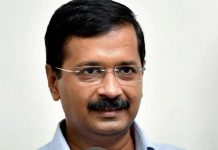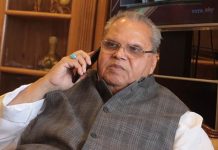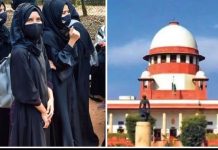
Pakistan appears to be imploding. Bomb attacks are taking place at alarming regularity and the Taliban has now threatened two attacks a week. Are you worried that Pakistan is now at war with itself?
All these problems are the creation of Mr Pervez Musharraf. Dictatorship is an excellent breeding ground for radicalism and terrorism. So frankly, the last eight years of dictatorial rule of Mr Pervez Musharraf is primarily responsible for the present state of affairs. He singlehandedly compromised the sovereignty of Pakistan. A one-man show is always counterproductive for the country. A one-man show really creates havoc, no matter where it is anywhere in the world. So terrorism is a direct benefit, I would say, of Mr Musharraf’s dictatorial rule. It is a huge problem now. We recognise it and we have to deal with it. But we have to deal with it sensibly.
So what is the sensible approach?
No single party can really deal with it single-handedly. You have got to deal with it in a unified manner. No party, whether in government or outside the government, can deal with this problem single-handedly.
You blame Musharraf and his policies. You are clearly referring to the line he had to take after 9/11. Is it easy for Pakistan to resist US pressure? Would you have been able to do that if you were the Prime Minister when America launched its war against terror?
In the first place, if I were the Prime Minister at that point of time I would have had an elected parliament and the matter would have been referred to the Parliament. And the Parliament should have taken that decision and not one man. Mr Musharraf actually gave everything away on one telephone call. He simply handed over our sovereignty in just one single telephone call. And that call was not from the president of the US but Mr Colin Powell. So that is how the dictators function. He was always talking about being a super commando and look what he did in response to one telephone call. He surrendered everything.
Do you fear a larger Talibanisation of Pakistan?
I don’t think so and I think we have to implement some dialogue also because force alone is not the answer. It has to be a multi-pronged policy. We have to carry out a comprehensive development of those areas [NWFP]. We have to have a comprehensive development plan. And at the same time, you’ve got to also remove the sense of deprivation of the local people. You’ve got to bring that local area at par with the rest of the country. So unless you address these key issues you really can’t deal with the issue of terrorism. And then, of course, engage in some kind of dialogue because Mr Obama’s policy also recognises the importance of dialogue with the moderate Taliban.
So is it a good idea to enter into a dialogue with Baitullah Mehsud?
Well, I think we have got to engage with all those who believe in moderation.
The new US President, Barack Obama has evolved a new plan to bring development and peace in Afghanistan and Pakistan. How do you view this plan?
He has talked about a multi-pronged strategy. He has also talked about adopting a regional approach. And he has also talked about dialogue with moderate elements in the Taliban ranks. So all these things are quite relevant. But what we don’t agree with the US on are the drone attacks, which are not helping at all. The drone attacks must stop immediately. They are proving to be counterproductive.
So they are actually adding to the ranks of the militant groups, would you say?
They are challenging our sovereignty and at the same time they are counterproductive and not helping anybody. They are also hurting the sentiments of Pakistan.
Musharraf surrendered Pakistan’s sovereignty with one telephone call. That call was not from the US president but from Colin Powell
The view in the official circles in America is that you are a social conservative, implying therefore that they prefer Asif Ali Zardari to you. Do you think it is a fair assessment?
I think this is sheer propaganda which was unleashed by Mr Musharraf for political purposes. I am of course a democrat of a forward-looking party, a progressive party. We believe in democratic principles, in democratic institutions. I believe in the rule of law and this is what we have been struggling for over the last eight years and we are very happy that we have made progress and got the judiciary reinstated.
Coming back to terrorism, would you have signed a peace pact with the Taliban in Swat?
I don’t want to make any comments because the NWFP has a provincial government and they don’t like anybody to make any comments, I would rather stay quiet.
Given the regularity of the suicide attacks, would you say that Pakistan has reached a tipping point?
We are not deterred by such actions and cannot afford to be. We have the will to fight them out. We have the will and the determination. So as long as the determination is alive, we will succeed.
It has been a little more than a year since the elections. How would you assess the government’s performance at the Centre?
We are still fighting on vital issues. And you know that Mr Zardari played games with us. We signed three different agreements but none was fulfilled. And then the government of Punjab was dismissed. And at the same time the Supreme Court gave out the ruling that disqualified me and Mr Shahbaz Sharif. So at that time I felt very strongly that rather than fighting terrorism, we are fighting democracy in this country. This is what has really kept us behind. We had a plan to strengthen democracy in the country and we could have made progress in the last one year, which we have not.
Drone attacks by the US are hurting the sentiments of Pakistan. They are Counterproductive and must be stopped
After you succeeded in restoring the judiciary, you have once again offered to co-operate with the Zardari government. Is he reciprocating your offer? And do you trust him after all that has happened?
There is no personal animosity. There is no personal vengeance. And there is no personal score to be settled with each other. And now you see, the first and the foremost thing is to re-establish democratic institutions. And if we do that, I think we will serve the cause of democracy. It is very important to strengthen democracy. And for that we have the charter of democracy which I signed with Benazir Bhutto three years back. It was also a part of the PPP’s election manifesto. By fighting and succeeding in restoring the judiciary, I have achieved one major target. Now my aim is to put the country back on a democratic path. So keeping all the personal things aside, we have decided to support the Zardari government, provided they follow the charter of democracy.

Photo: Reuters
What is the next item on your agenda? Reducing the powers of the President to sack elected Prime Ministers?
That is one item in the charter of democracy. There are other things like how judges can be appointed. Judges must be appointed through Parliament. And then of course you’ve got to strike a balance between the powers of the President and the Prime Minister. We have a parliamentary democracy in Pakistan, like you have in India where the Prime Minister runs the show. So we also want our Prime Minister to run the show as the chief executive of the country. And not like Mr Musharraf who had usurped all the powers of the Prime Minister and the Parliament and vested them in the office of the President. So we want to give those powers back to the Parliament and the Prime Minister. If the PPP government is willing to do that, we shall be very happy.
Pakistan claims to have shut down the Lashkar-e-Toiba but there have been attacks in Kashmir for which they have taken open credit. Do you think the ISI is really serious about tackling the terror threat after what you saw in Mumbai?
I express deep sorrow for what happened in Mumbai. And all those people who have been found guilty are non-state actors, frankly. And one can say without any fear of contradiction that the ISI was never involved in Mumbai. The ISI cannot afford to get involved in these practices. And also, I think the perpetrators of the morbid killings are all non-state actors. After Ajmal Kasab’s arrest, all Lashkar offices and even the schools run by them have been taken over by the government. So the government has taken really hard action against LeT.
If you were the Prime Minister and Pakistan had been hit, like India was hit in Mumbai, what would your response have been? Would it have been similar to the US, which attacked Afghanistan after 9/11?
If I were the Prime Minister, I would have seen how concerned India was and what India’s involvement was. I would find out if India was responsible or non-state actors in India were actually trying to subvert relations between the two countries. And if I would have come to the conclusion that there are non-state actors operating within India, then I would have sat down with India. I would have chalked out a strategy, a policy to jointly defeat all such elements who are busy trying to sabotage relations between Pakistan and India. It is their agenda to not allow two countries to come closer. And therefore it is not in our interest that we play into the hands of those whose agenda it is to keep the two countries away from each other. So I think we have got to now deal with these things very intelligently, to defeat their nefarious plans, to show better cooperation with each other. We should show solidarity and conduct a joint interrogation and a joint investigation into the Mumbai killings. That will inspire more confidence in each other. This is what the need of the hour is. Rather than allegations and counter-allegations, we should be extending more cooperation. But unfortunately, that’s not happening. If I were the PM of Pakistan today, I would have sent a team right away to India, to sit with its Indian counterparts and agree on a joint interrogation. And then do things in a transparent manner.
But the feeling in India is that Pakistan’s response has been inadequate because it took them a month to even admit that Kasab is a Pakistani citizen.
That is what I am talking about. There is a trust deficit. This trust deficit needs to be addressed and it is the first thing we should be doing.
WRITER’S EMAIL
shammy@tehelka.com













